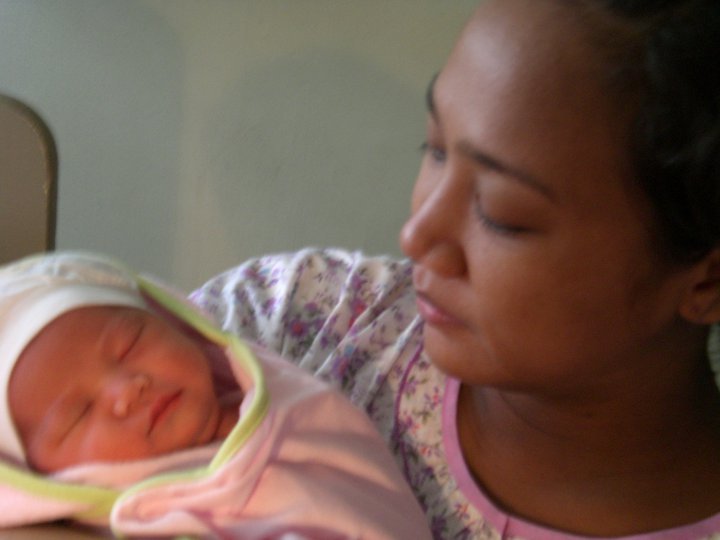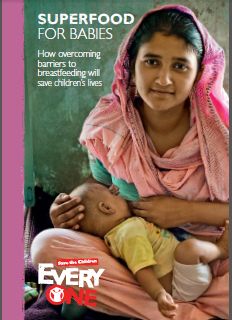This is a very important photo for me because this captured the first time I saw my daughter and held her in my arms. This is also the first time I have attempted to breastfeed. You see, I delivered through an emergency C-section and wasn’t able to have a glimpse of her after the operation. I was just assured by her pediatrician that she is a well baby and that comforted me. Nauseous with all the anesthesia and tired from all the labor pains, I succumbed to a restless sleep (because of the oxytoxin-a labor inducer in my IV), but I was excited though to see my princess. Breastfeeding is really my personal choice. First, I believe in all its benefits most especially to my baby and next I know that my breasts were present primarily for that reason.
Long before I was due, and maybe even on the onset of my pregnancy I have planned to breastfeed. I remember praying to God every night to give me an abundant supply of milk so that I can fulfill my plan. Amidst the hindrance of a wrong latch which plagued me with pain because of sore breasts for almost 3months and the sole responsibility of rearing the baby by myself because my husband is far away, I was able to survive breastfeeding with the help and support of my mother first and foremost. I am proud to say that I have exclusively breastfed my daughter for 19months. I was planning of making it longer had not some unforeseen circumstances came that forced me to wean her.
From my experience, I was able able to conclude that breastfeeding is a personal decision. Every mother has the ability to breastfeed her child no matter what the conditions are. If you are into it, then you can do it. But if you CHOSE not to, then you will not do it, as simple as that.
As part of the Global Team of 200 of Mom Bloggers for Social Good, the advocacy to promote breastfeeding is very close to my heart that is why when I was asked to be part of this Save the Children campaign I have no hesitations to fulfill it.
Breastfeeding is critical to preventing malnutrition and saving children’s lives in the developing world. Breastfeeding immediately after birth could help save 830,000 newborn babies from dying a year, and exclusive breastfeeding for six months could save even more babies and children.
Mothers everywhere should have access to information that allows them to make an informed choice about breastfeeding, and the support they need to breastfeed should they choose to.
In the U.S. there are benefits to breastfeeding, but it is not the same matter of life and death and mothers should feel supported in their choice, whatever it is. However, U.S. moms who choose to breastfeed don’t always get the support—including in hospitals or the workplace –that they need.
Save the Children’s new report finds there are four major barriers to breastfeeding and we need to support moms who choose to breastfeed to overcome these – especially in developing countries where it can save their babies’ lives.
Here are the four major barriers in the report that moms face in breastfeeding :
1. Cultural and community pressures – Many women not empowered to make their own health decisions – in a Sierra Leone survey 47% reported this was the case. Many cultural beliefs hindered colostrum from being taken during the first few hours of life believing it is unhealthy ans unsafe.
Save the Children works with fathers, with mothers in law, and even religious leaders to overcome these barriers. For instance, in the Philippines, our programs refer to verses from the Koran and quote Muslim leaders who assert that Mohammed was wet-nursed. In Ethiopia, our “Alive & Thrive” program uses TV ads making farming analogies to link good infant feeding practices to farming practices that fathers are familiar with. One husband remarked during the research for the project: “What I can do for my crops and cattle, I can do for my children.”
2. Global health worker shortage – The World Health Organization has estimated the global health worker shortage at more than 3 million – One third of moms give birth with no skilled health worker present.
For this report, Save the Children analyzed data in 44 countries and found that women who had a skilled attendant present at birth were twice as likely initiate breastfeeding within the first hour. In 1991, The Baby-Friendly Hospital Initiative was launched by WHO and UNICEF to implement practices that protect, promote and support breastfeeding. Facilities must implement “10 steps to successful breastfeeding” to get the designation and today, more than 20,000 hospitals in 156 countries have achieved this status, but it is stagnation status.
3. Lack of maternity legislation – For this report Save the Children commissioned research to look at maternity protection in the 36 low-income countries with the highest number of malnourished children. The study looked at whether maternity leave met the International Labor Organization (ILO) minimum standards (14 weeks leave moving toward a recommended 18), financial protections and policies to accommodate breastfeeding women at work. Only Vietnam met 18 weeks (6 months) leave and only 10 countries exceeded 14 weeks. Most of the 38 industrialized countries provide the recommended 2/3 pay during maternity leave, 5 countries provide between 30 (Japan) and 60 (Czech Republic) percent. In Australia and Denmark, maternity leave is funded by employers, but in the US there is no requirement at all that women be paid while on maternity leave, although some employers choose to.
Women working in the informal sector (street vending, domestic work etc) need financial protections if they are to breastfeed and maintain their families. India, for example, has started providing conditional cash transfers to these women while their babies are under 6 months old. Save the Children includes such transfers in its Myanmar programs as well. In the U.S. through the campaign for healthy kids, Save the Children has advocated for legislation at the state level to support breastfeeding mothers which include:
- 2011 legislation passed in Louisiana requiring state buildings to provide suitable spaces (that are not a bathroom) for breastfeeding, which went into effect July 1, 2012.
- 2011 legislation passed in Tennessee, striking language requiring children to be under 12 months old in order for mothers to be allowed to breastfeed in public, which went into effective July 1, 2011.
- 2010 legislation passed in Arizona requiring private areas for breast feeding as part of childcare regulation reform.
4. Aggressive marketing of breast-milk substitutes – The global baby food industry is estimated to be worth more than $36 billion and that figure is predicted to rise by 31% by 2015. Formula accounts for the majority of the industry – $25 billion. The International Code of Marketing Breast-milk Substitutes (“The Code”) was created by the World Health Assembly in 1981 and has been updated numerous times since. It is a set of minimum standards to promote and protect breastfeeding and ensure breast-milk substitutes are used safely if needed. Provisions include no advertising of breast-milk substitutes or promotional materials, no free samples to mothers, their families or health workers, no gifts to health workers, labels must state the superiority of breastfeeding and give a warning about health hazards, no pictures of infants or other pictures idealizing the use of formula, no direct contact with moms by marketing personnel.
Save the Children researched practices in a dozen countries for this report and performed original polling in Pakistan and China. – In China – 40% of mothers interviewed had been contacted directly by baby food company representatives. In a Gallup poll in Pakistan, 1/3 of health professionals said they’d been visiting by a representative of breast-milk substitute companies and 1/10 of health professionals said their health facility had received free samples of formula, nipple or bottles. In Sri Lanka, an international watchdog group (IBFAN) found that breast-milk substitute companies operate an incentives scheme for midwives, including offers of money and foreign travel in return for selling formula.
Our Call to Action
Breastfeeding is the world’s most powerful defense when it comes to saving children’s lives. It offers babies the best possible protection against malnutrition, which leads to thousands of children dying every single day.
All mothers should be able to make the choices that will give their babies the best start in life. All babies deserve to reach their full potential through good nutrition in the critical 1,000 day window from their mom’s pregnancy to their second birthday.
SIGN THIS PETITION, Vulnerable children need you to be their voice and tell the Secretary of State, John Kerry to demand renewal of the 1,000 Days Call to Action!
Find more information about Save the Children at http://www.savethechildren.org
I am a part of the Global Team of 200 and Social Good Moms‘ 24-Hour Blogathon spreading the word about Save the Children’s new breastfeeding report, Superfood for Babies. Sign the petition urging Secretary Kerry to help mothers around the world get more support around breastfeeding and lifesaving nutrition for their babies.


I came over from SSM but was thrilled to find this post and had to comment! I participated in this today and am glad to join forces with you 🙂 Beautiful pictures and a beautiful story!
What a beautiful picture and moment!
This is a great opportunity for mothers to be heard, there is nothing better than those first 6 months with breast milk. Thanks for sharing. Karren Google Stats
I have breastfed all of my children. My 5 month old is currently exclusively breastfed. Your story is amazing. My first child was also brought into the world by an emergency C section. She is the only of my children to ever have a bottle and that was only because of serious complications during my surgery that left me pretty much paralyzed for hours. I could not move even my fingers. Thankfully we got through our obstacles and I fought to give her the very best. She was exclusively breastfed thereafter, without bottles. I was also a young mother, but that did not impede my decision. Honestly, I am still a young mother at 23. Now I have three amazing kids and I know I have given them the best start by breastfeeding.